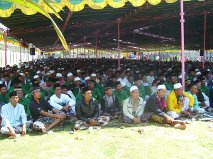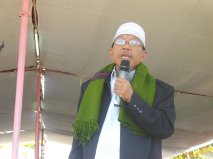The entanglement of religion and politics in Lombok has the potential to change the island’s social order in unexpected ways
Jeremy Kingsley
TGH Mustiadi Abhar, a respected religious leader – and an influential political powerbrokerJeremy Kingsley |
In just over a decade, Indonesia has shifted from autocratic military rule to democratic government. This transition has led the world’s largest Muslim majority nation to also become the world’s third largest democracy. One of the major consequences of this political transformation has been the ‘greening’ of politics, referring to the colour of Islam and the growing, yet uneven, influence of religion on political affairs. Perhaps nowhere is this growing influence more apparent than in the eastern island of Lombok, which in some ways represents a microcosm of Indonesian politics, while also remaining unique in many regards.
With the localisation of politics, regional elites have grappled, often bitterly, for the spoils of decentralisation. These power struggles are also evident in Lombok, an island of just over 3.5 million people, which has a reputation for being a particularly pious part of Indonesia (hence it is known locally as the ‘Island of a Thousand Mosques’). Local Muslim religious leaders, Tuan Guru, have emerged as a dominant political force in Lombok. Tuan Guru have taken key executive government positions and their support is a necessary ingredient for political success at the local level. Ironically, however, this very success could end up undermining their moral and political authority.
Tuan Guru and their politics
Tuan Guru and their religious organisations have played significant roles on Lombok in a non-state capacity for the last century. The main such organisations are Nahdlatul Ulama (NU) – Indonesia’s largest Islamic organisation – and Nahdlatul Wathan (NW), which is a local variant of NU. The latter organisation has now split into rival factions in the eastern Lombok towns of Anjani and Pancor (for one account of the split see ‘One Islamic organisation, two rival sisters’ by Kevin W Fogg and Muhammad Saleh Ending). Over the years, these religious networks have developed akin to para-states, taking responsibility for many public services, such as health, education and security. Therefore, the shift of Tuan Guru from being leading non-state actors to becoming formal political leaders is not surprising.
Tuan Guru now hold a number of key political positions in Lombok. Their most important victory so far occurred in 2008 when Tuan Guru Hajji (TGH) Muhammad Zainul Majdi (commonly referred to as TGH Bajang) was elected governor of the Province of Nusa Tenggara Barat, which incorporates the islands of Lombok and Sumbawa. Now, three of the six key local officeholders on the island are Tuan Guru. As well as the governor, Tuan Guru are the district head of East Lombok and mayor of Mataram, the capital of the province. Muslim religious leaders also hold important election-related positions, such as the head of the NTB Electoral Commission (KPU), and are members of legislatures across the island.
Political patronage
In Lombok, even political leaders who are not Tuan Guru often directly rely upon religious networks. For example, Zaini Arony, the head of West Lombok district, draws heavily upon the assistance of religious networks for his political operators and for mobilising support at election time. One Tuan Guru from West Lombok who runs a large Islamic boarding school (pondok pesantren) revealed that Arony is a regular visitor to his home seeking advice on spiritual and governance issues. There are also rumours that Arony rewards his religious backers generously. In order to show his appreciation for the backing of a prominent Mataram Tuan Guru, it is alleged that Arony provided the preacher with a brand new car. Whether or not this particular accusation is true, the story – and many others like it – allude to the close working relationship between political and religious leaders in contemporary Lombok.
It makes sense that politicians who wish to bolster their chances of winning office draw upon religious networks. Such networks provide a ready-made support base through their pesantren students (santri ) and their larger religious communities (jemaah). These religious networks are able to provide a candidate with votes and mobilise campaign workers in large numbers. For instance, the religious network surrounding TGH Mustiadi Abhar and his coalition of Tuan Guru is estimated to involve about 160,000 people in Mataram and West Lombok.
Religious networks are able to provide a candidate with votes and mobilise campaign workers in large numbers
One of the strongest capabilities of Tuan Guru is that they are able provide a mechanism for communicating a politician’s message to thousands of people. For instance, when TGH Mustiadi Abhar gives a religious education class (pengajian), as he does several times a week, hundreds of people attend and pay close attention to what he says. Mustiadi told me that he would never explicitly state that people must vote for any particular political candidate. However, his followers have indicated that they would never openly disregard Mustiadi’s political perspectives. I was told repeatedly that his political guidance was essentially binding upon them. Mustiadi supports Golkar and so therefore do they. All he needs to do is speak positively of a candidate to change their political preferences. And a preference for one candidate over another can also be made clear in other ways. A politician being invited to attend Mustiadi’s pengajian or ustadz (pesantren teachers) prominently displaying a politician’s poster on the wall of the boarding school are good examples.
In return for making such access and resources available to political candidates, religious leaders typically expect patronage in return. An example of the reciprocity between Tuan Guru and political candidates was apparent during the 2008 NTB gubernatorial elections. An East Lombok Islamic boarding school I visited was redeveloped in the lead-up to the elections, using funds provided by a candidate. Such assistance for pesantren is a common part of political campaigning in contemporary Indonesia.
A shifting landscape of political allegiances
Many Tuan Guru who have become political leaders had their initial induction to local politics through religious parties. TGH Bajang initially ran on a party ticket that incorporated Partai Bulan Bintang (PBB) and Partai Keadilan Sajahtera (PKS). The connection between religious leaders and religious parties seemed natural.
However, in the past few years the balance in this political equation has changed. Now most of Lombok’s leading politicians are affiliated with mainstream nationalist parties, such as Partai Demokrat and Golkar, rather than religious parties. This can be seen with TGH Bajang who has moved recently to Partai Demokrat, and TGH Ahyar Abduh, the mayor of Mataram, who is a prominent Golkar member. These nationalist parties are commonly associated not with the green of Islam, but with the red and white of the Indonesian flag. The entry into such parties by important local Islamic figures, such as the Tuan Guru of Lombok, symbolises the mixing of Islamic and nationalist politics in contemporary Indonesia.
Another local leader to have recently made the switch to a nationalist party is Zaini Arony. During the 2008 NTB gubernatorial race he was backed by a religious party, the United Development Party (PPP). Now, as well as being head of West Lombok district, he is the provincial leader of Golkar. His Golkar links partly reflect the influence of one of his key backers, TGH Mustiadi Abhar, who is also a prominent local Golkar figure. Mustiadi’s central role in Golkar has recently been acknowledged on the national stage when the party’s chairperson Aburizal Bakrie visited his boarding school.
This blurring of political colours seems at first glance to reflect a disjuncture between religious identification and political loyalty. However, it might just reflect a savvy political assessment that joining mainstream, and larger, political parties is an astute strategy. Through these major parties it is easier to have a larger impact on political affairs locally and nationally. For instance, these parties are able to assist local governments to coordinate their activities and funding requirements with their national counterparts. However, TGH Mustiadi Abhar told me there is another reason for this movement away from religious parties. He feels that religious parties often take religious leaders for granted and assume their support. Unlike the religious parties, Golkar operatives sought his participation directly and made him feel valued. Golkar was willing to give him and his allies opportunities within the party, and therefore, within local politics.
 |
The followers of the Tuan Guru are a massive political constituencyJeremy Kingsley |
Keeping it clean?
The prominent political role Tuan Guru play in contemporary Lombok raises many questions for these religious leaders. Most Lombok residents say that Tuan Guru play a positive role by cleaning up local politics. The desire for clean politics has significant resonance in Lombok where the last governor, Lalu Serinata, was sentenced to prison for three years for corruption. Many Tuan Guru cite the dishonesty exhibited by Serinata as a cautionary moral tale during their sermons and religious education classes.
In contrast to Serinata, TGH Bajang campaigned on a platform of cleaning up provincial politics and has undertaken moves as NTB governor to implement this position. An example of this is Program Unggulan, which is an independent commission he established to monitor key provincial government programs. The commission is designed to side step local bureaucratic intransigence and limit corruption through rigorous monitoring. This program only commenced in 2010 and as of yet its outcomes are unclear.
There is a counter thesis, however, which suggests that Tuan Guru are playing a high-stakes game of political poker. These religious leaders assume a pivotal socio-political role currently because they are spiritually ‘pure’ and organisationally effective. But what will happen if Tuan Guru become corrupted and identified with ineffective government? This possibility should provide Tuan Guru and their religious organisations with cause for concern. At the moment, Tuan Guru’s engagement in public office seems to be increasing the pool of talent within local political life. However, government efficacy is still limited and Tuan Guru’s receipt of large gifts, such as cars and funds for infrastructure, appears to compromise their integrity.
It is, therefore, not clear whether Tuan Guru will be able to remain untainted. Even a few rotten apples could affect the social status of all Tuan Guru. This could have serious consequence for the social fabric of the island where Tuan Guru are an integral part of local power structures. Any diminution of their social standing could create a leadership void. While Tuan Guru are currently powerful political, religious and economic actors it would be an ironic outcome if they became politically marginalised as an unintended consequence of their political success.
Jeremy Kingsley (Jeremy_kingsley@hotmail.com) is a Postdoctoral Research Fellow at the Asia Research Institute, National University of Singapore.












